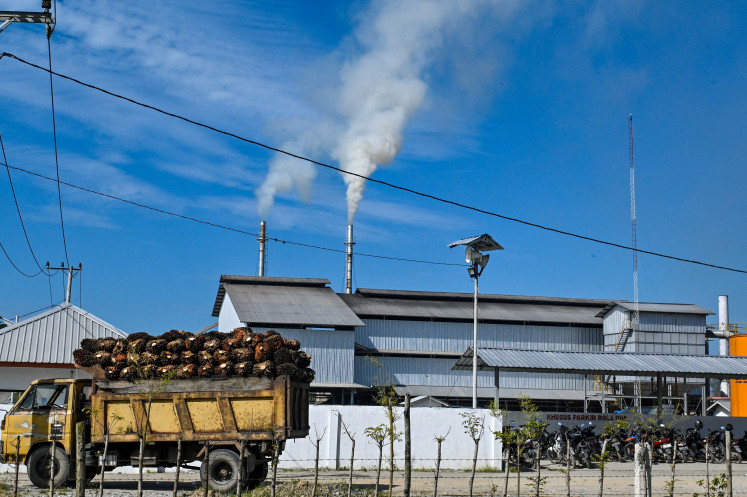Popular Reads
Top Results
Can't find what you're looking for?
View all search resultsPopular Reads
Top Results
Can't find what you're looking for?
View all search resultsSOEs go full speed ahead toward African shores
State-owned enterprises (SOEs) in the train manufacturing, construction and pharmaceutical manufacturing sectors are striving to expand exports to nontraditional markets, especially to African countries
Change text size
Gift Premium Articles
to Anyone
S
tate-owned enterprises (SOEs) in the train manufacturing, construction and pharmaceutical manufacturing sectors are striving to expand exports to nontraditional markets, especially to African countries.
"President Joko ['Jokowi'] Widodo has instructed [SOEs Minister] Erick Thohir to encourage our BUMN to expand their global markets," said ministerial aide Arya Sinulingga on Tuesday at the “BUMN Going Global“ seminar in Jakarta, referring to SOE by its Indonesian abbreviation.
The government is encouraging SOEs to focus more on exporting to nontraditional markets while maintaining exports to their traditional markets — China, the United States and European countries.
Speaking at the same event, PT Inka president director Budi Noviantoro said that export expansion was inevitable for the state-owned train manufacturer, because domestic demand for trains was extremely limited.
He added that Inka was shipping two train cars to the Philippines on Tuesday morning to fulfill its export plan for the year.
Budi had said earlier that Inka targeted export earnings of Rp 3.75 trillion (US$267 million) this year.
Toward this end, Inka is building Indonesia's largest train manufacturing factory in Banyuwangi, East Java, in cooperation with Stadler Rail, the renowned Swiss manufacturer of railway rolling stock.
The planned factory is to have a production capacity of four train cars per day — four times the capacity of Inka’s factory in Madiun, also in East Java.
Inka shipped its first export to Malaysia in 1991, followed by shipments to the Philippines, Thailand, Australia, Singapore and Sri Lanka.
In addition to exporting its train cars, Budi said that Inka also sought to join railway projects in Africa.
"Our ongoing projects include one in Madagascar," he said, adding that Congo was also interested in working with Inka on an 800-kilometer railway project.
Meanwhile, PT Wijaya Karya (Wika) operations director Destiawan Soewardjono said that the state-owned construction company was also expanding to African markets.
"We won big projects in Algeria in 2017," he said at Tuesday's seminar, noting that one of the projects was the development of 3,500 apartment units in the North African country.
Wika’s past projects in Africa included constructing a 1,200 km border highway between Morocco and Tunisia, which was developed from 2007 to 2013 in cooperation with Japan's Kajima Corporation.
Destiawan said that another major project for Wika was the Niger Presidential Palace renovation project in 2018, on which it was the main contractor.
Wika also won contracts this year to build a bulk liquid terminal in Zanzibar, a business complex in Senegal and a residential complex in Ivory Coast. The contract for the Ivory Coast project was signed at the Indonesia-Africa Infrastructure Dialogue 2019 in August, in which 53 African countries took part.
Destiawan said Wika planned to increase its 2020 list of overseas expansion destinations to 12 countries, from nine countries on its 2019 list.
Wika was also eyeing a joint project on developing an aircraft maintenance, repair and overhaul facility in Ethiopia next year with Garuda Maintenance Facility (GMF).
Destiawan said that expanding its business in Africa was becoming increasingly promising due to local growth.
"Some African countries show impressive economic growth, which is the reason for Wika focusing its expansion [in Africa]," he said. Destiawan added that the continent was projected to be the second-fastest growing region in the world in 2022, and that West African countries planned to develop 92 projects worth around Rp 1.67 quadrillion.
Meanwhile, PT Bio Farma was also targeting African markets as part of its export expansion plans, said its marketing director, Sri Harsi Teteki.
Sri said the state-owned pharmaceutical manufacturer had established export hubs in South Africa, Kenya, Egypt, Nigeria, Ghana, Senegal and Morocco to provide an entry point for distributing its medicines throughout the African continent.
Bio Farma primarily exports raw materials to vaccine manufacturers in India, followed by Argentina, Bangladesh, Myanmar and Thailand.
Expanding exports to nontraditional markets is necessary for SOEs, whose performance is declining in terms of contributing to Indonesia's economic growth.
According to Toto Pranoto, the president director of the University of Indonesia's Institute of Management, the institute found in a study that the ratio of total SOE profits to nominal GDP declined to 1 percent in 2018 from 1.4 percent in 2017, even though the ratio of total SOE revenue to nominal GDP increased to 15.9 percent from 14.9 percent over the same period.
Citing a separate study by PricewaterhouseCoopers, Pranoto said that the ratio of SOE profits to nominal GDP was 1.3 percent in 2014, compared to China's ratio of 3.1 percent. (dfr)










